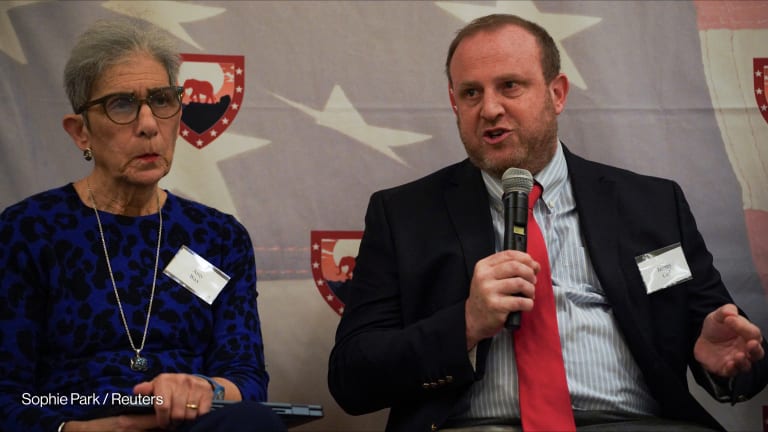
BURLINGTON, Vt. — The U.S. is “fundamentally misresourced” when it comes to protecting against global threats, according to Sen. Chris Murphy, a Democrat from Connecticut and leading voice on the country’s foreign policy in the U.S. Congress.
“The fact of the matter is that a disease that started in the fall on the other side of the world has, only six months later, shut down the American economy to the point that we are going to reach unemployment levels that are as high or higher than the Great Depression. If that isn’t an advertisement for why the United States needs to be globally involved, then I don’t know what is,” Murphy told reporters in a press call Wednesday.
US Senate Democrats introduce $9B international COVID-19 funding bill
Senate Democrats introduced a bill Friday that would chart a different course for the U.S. response to COVID-19. The legislation is unlikely to pass, but here is what it proposes.
That “fact pattern” has led Murphy to join with advocates for stronger global health engagement, who are asking that $12 billion for an international response to COVID-19 be included in the next supplemental spending bill that lawmakers are currently negotiating.
Last week, a group of Senate Democrats introduced a bill that would provide $9 billion for international coronavirus-related funding. The House of Representatives unveiled a spending proposal Tuesday that voiced support for international programs but made little progress toward the $12 billion mark.
Murphy said he is optimistic that senators from both parties will prioritize funding for global response efforts when they eventually come to agreement on what will likely be another massive spending package.
“I think there is an enormous amount of bipartisan support in the Senate for significant international funding in the next emergency relief bill,” Murphy said.
He added that he has discussed the issue with Sen. Lindsey Graham, a Republican from South Carolina and member of the Senate Committee on Appropriations who organized a phone call with lawmakers from both parties and the State Department to emphasize the need for more international funding. Murphy suggested that including funding for international programs might even be necessary for securing support for the next spending package.
“I know one of the ways to get bipartisan support in the Senate is to include some funding for international relief programs that many Senate Republicans are enthusiastic to have part of that package,” he said.
Murphy, considered a rising force for greater international engagement within the Democratic Party, also took aim at President Donald Trump’s decision to suspend U.S. funding for the World Health Organization.
“There is no way to rebuild the international public health infrastructure without the World Health Organization,” he said, adding that WHO has no more “inefficiencies” or “problems” than other international organizations.
“To the extent that the Trump administration argues that it has become too close to China, then they are effectively exacerbating the problem they are trying to solve by culling the United States out of the WHO,” Murphy said, adding that the U.S. government should instead increase its support for the international body and use that funding leverage to bring about necessary reforms.
Murphy also wants to undo the Trump administration’s decision to eliminate a White House office that was tasked with pandemic preparedness.
In April, Murphy and Republican Sen. Mitt Romney co-sponsored the Global Health Security Act, which would support the implementation of the Global Health Security Agenda, an international partnership created in 2014 to help countries identify and fill gaps in their health surveillance, preparedness, and response systems.
If passed, the bill would establish a Global Health Security Interagency Review Council and require the president to appoint a United States Coordinator for Global Health Security from the National Security Council.
Global health advocates have broadly criticized the lack of a coordinated, adequately funded global response to the pandemic so far, with the continued spread of the virus presenting an additional threat to countries that have already experienced damaging outbreaks.
“Unlike in other significant, but in fact lesser crises around the world, we’ve always seen the world come together in a way we haven’t yet seen,” Gayle Smith, president and CEO at the ONE Campaign and former administrator of the U.S. Agency for International Development, said on Wednesday’s call.
“There is no way to rebuild the international public health infrastructure without the World Health Organization.”
— U.S. Sen. Chris Murphy“The resources that have come through thus far are important. They’re not sufficient. I would hope that we could see an organization that I was very proud to lead at the end of the Obama administration … USAID, will be empowered to really get out and lead, because we all know it’s superbly competent in complex crises,” Smith said.
In its third emergency spending bill, passed in March, the U.S. Congress appropriated roughly $2 billion for global health response efforts through USAID and the State Department.
“The shocking thing is that just a few years ago … the world was investing roughly $5 billion a year in global health security. ... We’re using ‘trillions’ as though it’s a normal word,” Smith said.
Murphy described the U.S. government’s $65 million response to the United Nations’ $6.7 billion global COVID-19 funding appeal “unconscionable.”
He noted that the U.S. government spends roughly $11 billion annually on global public health programs, compared to roughly $740 billion for the Department of Defense.
“I don’t think there’s anybody in the United States today who would tell you that we should be spending 50 to 100 times as much money on conventional military hardware as we do protecting this country against a global pandemic, given what we are living through today,” he said.
Visit our dedicated COVID-19 page for news, job opportunities, and funding insights.









